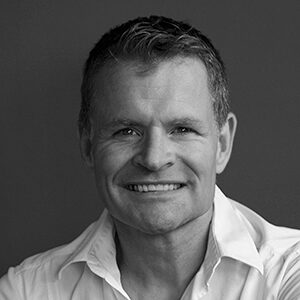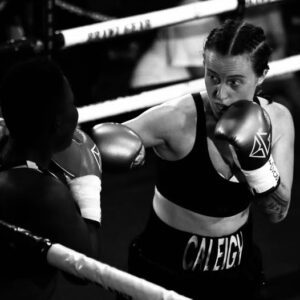
Rugby agent Craig Livingstone is the game’s ultimate dealmaker, a seasoned pro who takes on allcomers. The founder of LMG, he now represents an array of athletes, connecting them with corporates and teams. He’s known to clean up the odd mess, too, and ranks among the smartest minds in sport management.
How did you get into the business of being a sport agent, and when?
It all kicked off in ‘95 when we hosted the World Cup in South Africa. Rugby turned professional at that time and the Springbok rugby players were offered professional contracts. They spoke to Kitch Christie and [fitness coach] Ray Mordt, who I was very good friends with at the time, to say, ‘hey, we’ve been offered these contracts – who can we speak to?’ and me being a lawyer, they suggested the players talk to me. They did so and that’s where the opportunity arose. I gave legal advice on the contracts initially and then saw the commercial opportunity that followed. It’s been that way since ‘95, so next year is the big three-zero that I’ve been doing this.
Agents don’t have the best reputation. Why is that, and is it fair?
That’s a very good question. Agents historically have had a bad reputation and that stems from the football market in terms of doing deals for professional footballers.
But it’s extended into rugby as well, and we’re seen as the bad guy all the time. We’re seen as pushing the envelope when it comes to money and earnings for the players. Potentially some agents do make the wrong decisions and just chase the money for the player. But ultimately, you’ve got to make a decision which is best for your client, and sometimes it does entail getting more money, and sometimes it’s a better environment for them to move into from a playing perspective.
You have to juggle the two and make sure that when you’re making the decision as to where your client wants to play sport, whether it be football or rugby, that it’s a holistic decision that’s taken into account with a number of factors, mainly being environment, another being opportunity in terms of getting an opportunity to perform. It’s going into an environment for as much money [as you can earn] and being selected to play. You need to take a lot of factors into account.
Historically, [being a bad guy] is a tag that is going to be there forever, that agents are the bad guys. We take it on and it’s part of the sport where we are referred to as money-grabbing, horse-trading agents. That’s not necessarily the case, but it’s part of the business.
Who are some of the top athletes you’ve represented in the last 30-odd years?
There have been some amazing clients across the board in primarily rugby and cricket, with a dash of swimming too. It’s difficult to mention names, but for me, the most telling fact is that from’98 to 2015, I looked after every Springbok captain, about nine or 10 of them, which was amazing and a really fantastic experience.

I also represented some quality international coaches over time, like Jake White and then Eddie Jones. That’s in the rugby space. In cricket I looked after Graeme Smith, Makhaya Ntini and Quinton de Kock when they played and then in swimming it’s now Tatyana Smith (née Schoenmaker). There have been some amazing athletes. In rugby the ones that stick out would be Bryan Habana, Schalk Burger, Joost van der Westhuizen and John Smit. There have been many.
You have very obviously transitioned beyond rugby into other sports, other athletes. Why is that and what are the opportunities?
We took a decision in the last year to look at a more multi-sport based agency, which I believe is smart in having different sport pillars. This spreads the risk among the different athletes that you look after. Some perform better in one year than the other. Sometimes there’s a more interesting single sport than another particular sport based on a World Cup or a particular performance from certain individuals. To have different sports within the agency is a good move.
We’ve moved away from traditionally just being rugby with a sprinkling of cricket and potentially some swimming. Now we have a couple of pillars: a rugby pillar, a cricket pillar, a swimming pillar and a golf pillar which has been really new and interesting.
South Africa produces incredible sportsmen and women across the board in a number of different sports. It makes sense to look at them. We recently signed Jamie Riddle, the South African triathlon champion. We’re looking at different sports now, which gives a nice balance for us to manage. When you sit in front of a corporate client, corporates might not want the rugby player at that particular point in time. They might want to push golf or they might want to push another sport. It therefore works really well to have a multi-sport agency, but we still keep it small and prefer quality as opposed to quantity.
Why do athletes need agents?
The obvious reason is so they don’t get exploited, particularly early on. At a young age a person doesn’t really know much about signing contracts and what their values are. Then it’s important to have someone who knows the market and understands the values.
As their brand develops and as their brand grows, it’s very important to look at commercial opportunities and to commercialise the brand. To do that on your own is impossible because you need to focus on performance. That’s why you need an agent to assist and support the growth of your brand on and off the field. An agent is a necessity for a professional athlete, and there are many choices that the client or athlete has. It boils down to what the agent does in the best interests of the athlete or client.
What’s the craziest antic or episode you’ve experienced with a player, a mess you’ve had to clean up, something you’d prefer not to repeat?
Oh my goodness, there have been many. No names mentioned, but one of the messiest was in the late ‘90s when one of our clients went away for a weekend and hired a yacht somewhere off the coast of South Africa. The yacht was trashed and the owner was about to run to the newspapers with the story. We managed to resolve that [quietly] and nothing further transpired. There’ve been many of those types of incidents. I guess that’s also the role of the agent: to protect the client and the player and make sure that those things are kept out of the media.
What are the qualities a good agent requires?
The most important quality is to be strong on marketing and sales because you’re selling your athlete client to a club or a team and you must commercialise the athlete and build the brand. You need to understand the value that the athlete brings.
Linked to that is being patient and calm and having a good head on you because it’s very much a cut-throat industry in terms of the number of agencies trying to get a spot at the table.
Clients can also be big on their egos, so don’t get too absorbed and too emotionally connected with the process because that could drive people crazy. You obviously need to have a level head on your shoulders, a good quality. And then a great network in terms of creating opportunities for your clients. It’s global; you can’t just think within the country you operate, you need to think internationally and you need to have contacts locally and internationally who create the opportunities for your athletes and the clients that you manage.
How do you balance the need to have good clients and to identify great young talent? As an example, you see a 14-year-old prospect in rugby. Is it healthy to go after a kid like that, and how do you protect them?
We do produce the most phenomenal talent in South Africa, in a number of sports. It’s important not to exploit the youngster at such an early age. As an agency, we only sign our clients when they actually turn 18. A number of other agencies sign them younger. We don’t, but we may develop a relationship so they get to know us and we get to understand them.
There have been a number of instances where guys are exploited. At a young age, they just need to get out there and play, and they don’t need the additional pressures of having an agent putting pressure on them or talking them up when they should rather be just focusing on the performance side of things.
[The age restriction] should be regulated, taking away the issue of them being exploited at a young age, because only when they’re 18 can they legally sign contracts. It’s an age we believe is prudent, but we do start conversations earlier with parents or their guardians so that they know who we are and we can start developing a relationship. You don’t want to kill an athlete before they’ve started to develop. There are so many talented ones and if they believe their hype at such a young age, it can become problematic from a mental point of view. We rather want to let them focus on performing and only sign them when they’re 18.
Final question, perhaps the most the most difficult. As someone who is both in and outside rugby, the game is very much in a state of transition. Internationally, the need for a global season is critical. There is regular talk of rival or rebel leagues. South Africa has aligned with the Northern hemisphere. It’s all quite messy, and now there are equity deals on the table for South African rugby. It’s a game that’s in a state of flux. How are you seeing it and how is it going to play itself out?
Rugby is in an absolute state of transition. It’s in dire need of a revamp for an IPL-type format of the game. Unfortunately, the current format of no global season is a problem and a hindrance. But I do believe that something needs to happen where there’s a tournament in a window of six to eight weeks in the calendar [beyond the World Cup] where the best players in the world play against each other.
There could be a fantastic spectacle for the game and it would elevate and take rugby to a new level. But there’s still a lot of work that needs to be done in terms of how best to apply it, and a global season would assist with that.
The role-players need to understand and acknowledge that’s something that we need. Private equity coming into the sport has been inevitable. A lot of the teams haven’t been able to function financially, so investment takes away the financial pressure. More private equity involvement will ultimately see more opportunities coming into our game. Potentially a private equity deal which allows an IPL format to take place is probably on the cards, and I certainly think within the next five years. It’s something desperately needed in rugby. Hopefully the players can all get together and sit down and come up with a formula that works for everybody.
Rugby is in an interesting place, particularly because a lot of the teams and clubs around the world are not making money, and there’s a need to grow the game globally as well. The players are obviously high value commodities internationally, so it’s an interesting space to see what happens. I think it’s inevitable that a new format of rugby takes place and certainly would be supportive of it if it’s constructed correctly and has the support of the main role-players. It could elevate rugby and take it to a new level similar to what the IPL has done for cricket.







